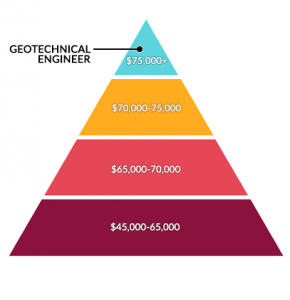3 Simple Techniques For Geotheta
Table of ContentsHow Geotheta can Save You Time, Stress, and Money.Some Known Factual Statements About Geotheta Not known Facts About GeothetaGeotheta Things To Know Before You BuySome Known Factual Statements About Geotheta

They conduct website examinations, gather examples, carry out laboratory tests, and examine information to evaluate the suitability of the ground for building projects - Consulting Engineers. Based upon their findings, geotechnical designers offer referrals for foundation style, slope stability, maintaining frameworks, and mitigation of geotechnical hazards. They team up with various other specialists, such as architects, architectural designers, and construction teams, to guarantee that geotechnical considerations are integrated into the total task layout and execution
By analyzing the actions and residential properties of dirt and rock, they can recognize prospective geotechnical risks such as landslides, dirt negotiation, or incline instability. Their proficiency helps prevent failures or accidents that might threaten lives and building. Below are some thorough obligations and obligations of a geotechnical designer: Site Investigation: Geotechnical designers conduct website examinations to collect data on subsurface problems.
They interpret the data to recognize the buildings and behavior of the soil and rock, including their stamina, leaks in the structure, compaction characteristics, and groundwater conditions. Geotechnical Evaluation and Design: Geotechnical engineers assess the information collected during site investigations to evaluate the security and suitability of the website for building jobs. They perform geotechnical estimations and modeling to review variables such as birthing capability, negotiation, slope stability, lateral planet pressures, and groundwater flow.
The Geotheta PDFs
Foundation Layout: Geotechnical designers play a critical function in making structures that can safely support the designated framework. They evaluate the soil problems and tons demands to establish the appropriate foundation type, such as shallow structures (e.g., grounds), deep foundations (e.g (https://www.huntingnet.com/forum/members/geotheta.html)., heaps), or specialized strategies like dirt improvement. They consider variables such as settlement limitations, birthing capacity, and soil-structure communication to establish ideal structure styles
They examine building plans, display website tasks, and perform field inspections to confirm that the design suggestions are followed. If unanticipated geotechnical problems occur, they assess the circumstance and give recommendations for remediation or modifications to the layout. Risk Evaluation and Mitigation: Geotechnical designers analyze geotechnical dangers and risks connected with the project website, such as landslides, liquefaction, or soil disintegration.

Collaboration and Interaction: Geotechnical designers function very closely with various other professionals associated with a job, such as architects, structural engineers, and building teams. Reliable interaction and partnership are important to integrate geotechnical considerations right into the overall job layout and building procedure. Geotechnical engineers give technological expertise, solution queries, and make certain that geotechnical needs are fulfilled.
The smart Trick of Geotheta That Nobody is Talking About
Right here are some types of geotechnical engineers: Structure Designer: Foundation engineers focus on creating and evaluating foundations for structures. They analyze the dirt problems, tons demands, and website characteristics to figure out the most ideal foundation type and layout, such as superficial foundations, deep foundations, or specialized strategies like stack structures.
They review the elements affecting incline stability, such as dirt residential or commercial properties, groundwater conditions, and incline geometry, and establish approaches to avoid incline failures and reduce dangers. Quake Engineer: Earthquake engineers concentrate on assessing and developing structures to withstand seismic forces. They assess the seismic threat of a site, review dirt liquefaction potential, and create seismic design criteria to make certain the security and strength of structures during earthquakes.
They perform field testing, accumulate examples, and evaluate the accumulated information to characterize the soil properties, geologic formations, and groundwater problems at a site. Geotechnical Instrumentation Designer: Geotechnical instrumentation designers concentrate on monitoring and measuring the habits of dirt, rock, and frameworks. They set up and preserve instrumentation systems that monitor elements such as soil negotiation, groundwater degrees, slope movements, and structural displacements to analyze efficiency and offer very early warnings of prospective concerns.
The Buzz on Geotheta
They carry out examinations such as triaxial tests, consolidation examinations, direct shear examinations, and permeability tests to gather data for geotechnical analysis and design. Geosynthetics Engineer: Geosynthetics engineers focus on the layout and application of geosynthetic products, such as geotextiles, geogrids, and geomembranes. They utilize these products to boost dirt security, strengthen slopes, provide water drainage remedies, and control erosion.
They have a tendency to be investigatory individuals, which indicates they're intellectual, reflective, and analytical. They are interested, methodical, reasonable, analytical, and logical. Some of them are additionally social, indicating they're kind, charitable, participating, patient, caring, valuable, compassionate, sensible, and friendly - Engineer of Record.
In the workplace environment, geotechnical engineers utilize specialized software tools to carry out estimations, create layouts, and evaluate information. They prepare records, evaluation job requirements, interact with customers and team participants, and coordinate job activities. The workplace setting supplies a conducive setting for study, analysis, and cooperation with other experts entailed in the project.
See This Report about Geotheta
They often check out job websites to perform website examinations, evaluate geotechnical problems, and collect information for analysis. These gos to include traveling to different places, sometimes in remote or difficult surfaces. Geotechnical designers may do dirt sampling, conduct tests, and monitor building and construction tasks to make certain that the geotechnical facets of the job are being carried out properly.
Geotechnical engineers also work in specialized geotechnical research laboratories. In these facilities, they carry out experiments, perform tests on dirt and rock samples, and examine the design buildings of the products. Geotechnical laboratory engineers function thoroughly in these atmospheres, handling screening equipment, running tools, and recording data. They collaborate with various other laboratory personnel to guarantee accurate and trusted screening outcomes.